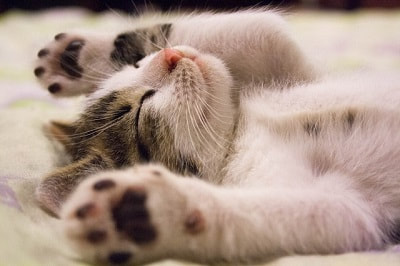The True Costs of Owning a Cat in New Zealand
Our guide explains the full recurring and non-recurring costs of cat ownership. We also outline the top facts you need to know and the most frequently asked questions New Zealanders have regarding cat costs.
Updated 9 February 2024
Summary
Disclosure: Many of the costs below are approximations based on the typical expenses associated with owning a cat in New Zealand, but this information will inevitably be subject to shifts or changes depending on your unique situation and other factors such as the cat’s lifespan, how much you’re prepared to spend on your cat, and so on. All costs displayed below are annual estimated costs unless described in the one-off section or stated otherwise.
Summary
- Cats are known for making great companions that require relatively little maintenance. However, many New Zealanders don't realise that the costs associated with owning a cat (like buying, raising, feeding and caring for a cat) can vary widely, causing much uncertainty for household budgets.
- Cats need a safe and comfortable home, as well as food, water and toys to keep them occupied and happy. Cats also need to visit the vet for regular checkups and vaccinations. All these things come at a price, so if you're considering getting a cat, you should consider all the associated expenses before deciding. Additionally, it can be hard to understand how much a cat can cost them throughout a cat's life.
- This guide explains the full recurring and non-recurring costs of cat ownership. We also discuss the most frequently asked questions New Zealanders ask and the top facts you need to know regarding cat costs.
Disclosure: Many of the costs below are approximations based on the typical expenses associated with owning a cat in New Zealand, but this information will inevitably be subject to shifts or changes depending on your unique situation and other factors such as the cat’s lifespan, how much you’re prepared to spend on your cat, and so on. All costs displayed below are annual estimated costs unless described in the one-off section or stated otherwise.
What are the main costs associated with owning a cat?
The guide has been segmented into three distinct cost sections. Below is a breakdown of some of the key costs associated with cat ownership in New Zealand:
1. One-Off Costs
1. One-Off Costs
Category |
Estimated Annual Cost |
Cost of Purchasing the Cat |
$125 - $2,000+ |
Cat’s Bed/Tower |
$100 - $1,000 |
Fencing Around the Property |
$0 - $3,000 (depending on how much existing fencing around the property there is) |
Spaying/Neutering |
Around $400 to $500 |
Microchipping |
Between $35 - $70 |
2. Essential Recurring Cost
Category |
Estimated Annual Cost |
Cat Food |
$400 - $1,200 |
Cat Litter |
$100 - $500 |
Vet Consultation |
$50 - $80 (per 15 minute consultation) |
Annual Vaccinations |
$40 - $200 |
3. Non-Essential Recurring Costs
Category |
Estimated Annual Cost |
Pet Insurance |
Around $200 - $300 (basic insurance plans) |
Cat Treats |
Around $200 |
Cat Toys/Accessories |
$200 - $400 |
Cat Collars |
$10 - $100 |
Kitten Training |
$200 - $1,000 |
Cat Grooming |
$50 - $100 (per session) |
Cattery |
Around $30 - $100 (per day) |
We will break down each cost listed in the guide below:
One-Off Costs
There are several one-off costs associated with bringing a new cat into your home:
The Cat Purchase Price
If you're adopting a cat from the SPCA, the first cost you'll need to pay is the adoption fees, which can range anywhere from $125 to $300 depending on the cat's breed, age, and health. If you're looking to get a cat from a breeder, you can expect to pay anywhere from $500 to $2,000.
Note that most cats from the SPCA may already come vaccinated or spayed/neutered. However, when purchasing from a breeder, be sure to factor in the costs of spaying or neutering as well as any shots that may be required, as breeders may not have done these procedures before you purchase the cat.
Note that most cats from the SPCA may already come vaccinated or spayed/neutered. However, when purchasing from a breeder, be sure to factor in the costs of spaying or neutering as well as any shots that may be required, as breeders may not have done these procedures before you purchase the cat.
Cat Bed/Tower
While your cat may decide to sleep on your bed, Kiwis usually buy a dedicated cat bed for their furry friend, generally a round bed or a tower. The average cost of a cat bed or tower varies extremely depending on the size and materials used. However, cat beds/towers generally range from $100 to $2,000 for multi-storey plush towers that can house multiple cats.
Spaying/Neutering
If you adopt your cat from the SPCA or another shelter organisation, it will likely already be spayed or neutered. However, if you purchase them from a breeder, you'll likely need to take your cat to a vet clinic to get this operation done, which will be an additional cost you need to factor in. Spaying and neutering usually cost between $120 and $400, depending on the sex of the cat and where you live.
More details: Desexing a cat
More details: Desexing a cat
Microchipping
Microchipping is the method used to keep track of your cat. The microchip is usually implanted beneath the cat’s skin, making it harder to detect and remove than collars or tags. The typical cost of microchipping is usually between $35 and $70.
Essential Recurring/Ongoing Costs
In addition to one-time costs, some recurring costs are associated with owning a cat. Most costs below are incurred at least once a year. Some of the most popular essential recurring costs include:
Cat Food
Food is one of the biggest ongoing expenses of a cat owner. Generally, most pet owners feed their cats wet and dry food to ensure that their cat is properly hydrated (from the wet food) and that a cat's dental health is supported (from the dry food). Depending on the cat's size, you can expect to spend anywhere from $30 to $100 per month (c. $400 - $1,200 per year) on food for generic brands. For more premium food brands, you'll likely be paying $200+ ($2,400) per year.
Vet Consultation
Even if your cat is healthy now, it may eventually need to see a vet for routine checkups, teeth cleaning, or accidents (not to mention unexpected illnesses or injuries that may come up). Consultations are normally around 15 minutes and are a good opportunity to check that your pet is healthy, behaving correctly and has no underlying issues. Unfortunately, the average vet consultation bill is c. $50 (with some being more expensive depending on where you live).
More details: Vet costs in New Zealand
More details: Vet costs in New Zealand
Cat Litter
Like cat food, cat litter prices vary widely depending on the quality and type. Clumping litter tends to be more expensive than non-clumping litter. However, clumping litter is much easier to clean up. Generally, for a normal size cat, a 3kg bag of clumping litter lasts about a month. If your cat is an outdoor cat, you may need to spend less on cat litter as they'll likely go to the bathroom outside. For the basic clumping litter, it'll cost $10 - $20 per month on litter costs. The more premium litter may cost upwards of $40 a month.
Vet Consultation
Even if your cat is healthy now, it may eventually need to see a vet for routine checkups, teeth cleaning, or accidents (not to mention unexpected illnesses or injuries that may come up). So it's recommended to take your cat in for a checkup once a year. Consultations are normally around 15 minutes and are a good opportunity to check that your pet is healthy, behaving correctly and has no underlying issues. Unfortunately, the average vet consultation bill is c. $50 (with some being more expensive depending on where you live).
Annual Vaccinations
Your cat will also need annual vaccinations to protect against diseases or infections. Vaccinations can cost anywhere from $40 to $200, depending on the age and health history of the cat.
Optional Recurring/Ongoing Costs (non-essential costs)
While the above costs are considered "essentials" and are likely necessary to ensure your cat is given the minimum required care, several recurring costs aren't strictly necessary. Still, many Kiwi cat owners decide to spend to enhance their cat's health and happiness. Therefore, most costs below are incurred at least once a year. Some of the most popular optional recurring costs include:
Pet Insurance
While technically not essential and likely not necessary for kittens, pet insurance is heavily recommended for cats in early to middle age when more health-related issues can crop up. It will cost roughly $250 for the basic plan but note that the plus or premium plans will cost significantly more each month (but come with higher coverage amounts and lower excess amounts). Also, note that the SPCA (as a non-profit) also offers pet insurance.
More details: Compare Pet Insurance and Is Buying Pet Insurance Worth It?
More details: Compare Pet Insurance and Is Buying Pet Insurance Worth It?
Cat Treats
Above and beyond the usual standard cat food, cat treats are a great way to feed your cat outside of traditional feeding breakfast, lunch or dinner feeding times. Cat treats are a useful way to complement training your cat tricks, rewarding good behaviour or just keeping them happy. In addition, cat treats are relatively inexpensive, with a packet costing around $15 (lasting for a few weeks).
Toys and Chews
Toys and chews are a great way to keep your cat out of trouble and entertained. Most cat toys usually cost around $20. However, the cost of cat toys can vary dramatically depending on the size, complexity and quality.
Cat Toys and Accessories
Generally, cats are much happier and healthier when they have toys and accessories to play with. A scratching post is the most popular cat accessory, which has the dual effect of entertaining your cat whilst also ensuring your furniture doesn't get scratched up.
Other types of toys, such as mice, balls or laser lights, can keep them entertained and encourage them to get exercise, especially if they're indoor cats. Expect to spend around $30 per month on toys and accessories for your cat. However, the cost of cat toys can vary dramatically depending on the size, complexity and quality.
Other types of toys, such as mice, balls or laser lights, can keep them entertained and encourage them to get exercise, especially if they're indoor cats. Expect to spend around $30 per month on toys and accessories for your cat. However, the cost of cat toys can vary dramatically depending on the size, complexity and quality.
Cat Collars
Cats are known to roam around when left to their own devices outside, so they need to have a collar to let other Kiwis know that the cat isn't stray and has an owner. If a cat doesn't have a collar, other neighbouring households may assume it's a stray and start to feed your cat, which can confuse the cat as it may associate "home" with multiple places. Cat collars are relatively inexpensive, ranging from $10 to $100.
Cat Training
For those keen to minimise cleaning and expedite the bathroom training process, kitten training can be an ideal way to get your kitten up to speed on things such as bathroom training, aggression control or general reductions in cat anxiety levels (especially if they have been rescued and subsequently adopted). But, unfortunately, cat training costs anywhere from $200 to $ 1,000 per month.
Cat Grooming
For those looking to give their cat a treat, cat grooming can be a great way to outsource this process and get your cat feeling its best. Cat grooming sessions usually cost $50 per session and can go to $100+, depending on where you live.
Cattery
Cats are happy being on their own and are "low maintenance" relative to other pets. However, if you're going to be away for long periods (like overseas travel or on a road trip), even cats get lonely and need interaction with other people or cats. Catteries are one way to keep your cat happy, healthy, and interacting with people without you having to be there physically. Most cattery services will sit around $30 - $100 depending on the quality of service, vacancy/space and location of the cattery.
Get Pet Insurance Quotes With Our Top Insurers
|
Our pet insurance research highlighted a shortlist of price and value-leading pet insurers.
|
Christopher Walsh
MoneyHub Founder |
Must-Know Facts about Cat-Related Costs in New Zealand
While the monetary side of cats can look daunting, don't forget all the benefits of having a cat.
Research has shown that having a pet is excellent for people's mental and physical health. These intangible benefits shouldn't be overlooked and can easily result in many more years of youthful life for many Kiwis.
When swapping some activities out, owning a cat won't be as expensive as you think.
Whether swapping your expensive gym membership for cuddling up with your cat or bringing your friends together to have a cat hangout instead of going out, the savings you could make by substituting current costs can help offset the ongoing costs of having a cat.
Cats will generally live longer than other pets.
Cats typically live for around 15 years, compared to dogs that will live for around 11 years on average. Therefore, you should be prepared for cat ownership's longer-term commitment and cost.
While most cats are healthy, they can be susceptible to certain diseases and health conditions.
Cats become more susceptible to health conditions as they age. Generally, these health conditions can be expensive to treat, such as diabetes or cancer. These conditions can be extremely expensive and usually require months of treatment. If you don't have pet insurance in place when the cat is in middle age, you won't be able to take out a policy once the cat gets into old age. Keep this in mind when your cat starts to get into middle age.
More details: Compare Pet Insurance and Is Buying Pet Insurance Worth It?
More details: Compare Pet Insurance and Is Buying Pet Insurance Worth It?
Cats are generally less time-intensive and more independent than dogs.
While most dog owners will need to take their dogs for walks daily, shower them with attention and continuously interact with them daily, cats are significantly more independent. Of course, all cats have different personality types, but generally, cats will spend a significant portion of their time sleeping. When awake, cats usually prefer to explore outside or lounge around. This behaviour can be both a benefit and a drawback of getting a cat, so make sure you're aware of the typical behaviour of a cat before getting one.
The amount of time a cat spends outside will impact longevity and health.
Generally, cats that spend more time outdoors will get more exercise, promoting better health and longevity. However, cats that spend time outdoors may get into more fights with other cats (given a cat's territorial nature), which may result in more visits to the vet from cuts and injuries due to catfights. On the other hand, outdoor cats also spend substantial amounts of time in the sun. This sun exposure may increase the risk of cancer due to sun exposure over the long term. Keep these in mind when deciding how long to let your cat outside.
Ideally, try to have either an emergency fund or pet insurance.
If you decide against purchasing pet insurance, make sure you've got an emergency fund that you can use to pay any vet bills that arise. If you don't have this in place, your cat may unexpectedly come back from a fight with severe injuries that require an operation that could cost thousands. Another tip is to allocate the money you would've spent on pet insurance into a separate saving account for the emergency fund to act as a replacement for the pet insurance. This strategy can be a good way of ensuring you have enough money to cover any unexpected cat costs without taking that money out of your monthly budget.
Conclusion
To summarise, cats can be extremely expensive, so it's important to research what you're getting into (both financially and mentally). In addition, before deciding to get a cat, it's important to factor in all the associated costs so that you can be prepared financially when your cat arrives. This guide outlines some of the main recurring and non-recurring costs you'll face when owning a cat in New Zealand.
However, relative to other investments or purchases in your life (such as children, holidays or cars), many Kiwis conclude that the intangible benefits of having a cat far outweigh the monetary costs of a cat. Hopefully, this guide has clarified the typical monetary costs to expect so that Kiwis can plan when they get a new furry family member.
However, relative to other investments or purchases in your life (such as children, holidays or cars), many Kiwis conclude that the intangible benefits of having a cat far outweigh the monetary costs of a cat. Hopefully, this guide has clarified the typical monetary costs to expect so that Kiwis can plan when they get a new furry family member.
Frequently Asked Questions
What are the benefits and drawbacks of getting a kitten versus a middle-aged cat?
Generally, a kitten will be more expensive to buy than a middle-aged cat, as many Kiwis prefer to be present in the cat's life from an early age. Also, generally, middle-aged cats run into more health issues than kittens, given they've already lived for a significant period. Therefore, getting middle-aged cats can be significantly more costly for many Kiwis.
Having said that, most cats will live between twelve and eighteen. This scenario means that even if you get a cat that's seven or eight years old, it may still live for over a decade from when you get them. Usually, middle-aged cats will already have developed concrete personality and behaviour traits, be much calmer compared to kittens and have lower maintenance.
Having said that, most cats will live between twelve and eighteen. This scenario means that even if you get a cat that's seven or eight years old, it may still live for over a decade from when you get them. Usually, middle-aged cats will already have developed concrete personality and behaviour traits, be much calmer compared to kittens and have lower maintenance.
Vet bills are so expensive! Where are the best places to go to reduce my vet bills?
Vets are notorious for not having standardised pricing across vet clinics. As a result, some vets offer lower prices for the same services, so they can pay to look around and find the best place. For more information, visit our guide to vet pricing.
Is owning a cat worth it?
That'll all depend on you and what you want out of it. For some, a cat can bring immense joy and passion to your life. For others, a cat can provide a cuddly friend for a family and young child as they're growing up. However, owning a cat isn't free and comes with many responsibilities. Whether a cat is worth it will vary for each person.
How much will it cost to adopt a cat from the SPCA?
The adoption fee for kittens from the SPCA is $200. The adoption fee for cats (considered older than five months) is $125. This kitten/cat cost includes desexing, microchipping, and vaccinations. Adopting a cat can be a great alternative if you want to adopt a cat on a budget.
What's the rough cost of getting a cat desexed?
The cost of spaying/neutering a cat depends on the specific vet, but it usually ranges from $200 - 400.
What are the costs of getting a kitten versus getting a middle-aged cat?
Generally, getting a kitten will be more expensive than getting a middle-aged cat. However, it's important to consider that the middle-aged cat may run into health issues that could be costly down the line. Most cats live between 12 to 18 years, and smaller cats (generally eating less and having slower metabolisms than bigger cats) usually live longer than smaller cats.
At what point is it infeasible for me not to get a cat?
There's no set point where you shouldn't go and get a pet. However, weighing all the pros and cons associated with getting a cat and the ultimate costs that come with cat ownership is important. Ultimately, if you aren't able to feed, tend and care for the cat due to the costs associated with cat ownership, you probably shouldn't get a cat.
It would be much easier on you, your family, and the cat (that would ideally go to a new owner) if you didn't get a cat if you can't afford to support it for the entirety of its life. Many cats are either sent to the SPCA, abandoned or put down every year because cat owners cannot tend to and care for them. Make sure to ask yourself whether you can financially support the cat before actually going to get one.
It would be much easier on you, your family, and the cat (that would ideally go to a new owner) if you didn't get a cat if you can't afford to support it for the entirety of its life. Many cats are either sent to the SPCA, abandoned or put down every year because cat owners cannot tend to and care for them. Make sure to ask yourself whether you can financially support the cat before actually going to get one.
Are cats more expensive to buy than dogs?
While it depends on the breeds, you're comparing. Generally, cats are less expensive than other household pets (such as dogs). However, if the cat is purebred, it can be significantly more expensive than other household pets. For example, unique breeds such as the Norwegian Forest Cat can easily cost thousands of dollars, given their rarity in New Zealand.
However, for those adopting a cat from the SPCA, it can be relatively inexpensive, costing $125 - $200 and will usually already be desexed, microchipped and vaccinated (saving you another few hundred dollars).
However, for those adopting a cat from the SPCA, it can be relatively inexpensive, costing $125 - $200 and will usually already be desexed, microchipped and vaccinated (saving you another few hundred dollars).
How much money will I need to have set aside for the first year before I get a kitten/cat?
While it will vary heavily depending on the breed of cat you want, the typical costs you’ll likely incur (and the money you’ll want to have set aside) can range anywhere from $1,000 on the lower end to $4,000+ on the upper end (this is excluding purebred cats, which will add a few thousand to this number).
How much will it cost to maintain and care for a cat each year?
The New Zealand Companion Animal Council surveyed pet owners (in 2015) to understand the typical ongoing cost of maintaining and supporting a cat for a year. The rough estimate was around $700 a year (for comparison purposes, the rough estimate for maintaining and supporting a dog for a year was $1,700, more than twice the cost of supporting a cat). Note that this survey was conducted many years ago, and inflation is likely to have pushed this ongoing cost to over $1,000.
How much will a cat cost over the entirety of its life?
It will vary depending on the breed and how long the cat lives. However, if we assume the average cat lives fifteen years and costs c. $1,000 a year with an initial upfront cost of $2,000 in the first year, the cost of a cat over its lifetime will be around $17,000. Note that this doesn't include some non-essential costs, which may significantly increase the lifetime cost of having a cat. Nevertheless, this is slightly cheaper than the estimated cost of getting a dog over its life (at around $23,000).
What's the highest cost of maintaining a cat?
For most of a cat's healthy life, the biggest expense for cat owners will be food. Usually, this will make up 50% of the total ongoing costs for the cat. The next largest cost is usually the administrative and medical cost of keeping your cat updated and healthy, such as annual vaccinations, registration fees and any medical treatments.
As cats age, the highest cost can become the medical procedures or surgeries required in old age. These usually start at a few thousand and can go as high as $5,000, depending on the type of operation. Be aware that the cost of keeping a cat healthy in old age increases exponentially. If you have pet insurance, you'll likely be able to sidestep much of this cost. However, after a certain age, pet insurers won't allow you to insure your pet (as the likelihood of injury and the risk/cost to the insurer makes it impractical for them to offer you insurance). However, suppose you've already set up a policy during a cat's earlier years. In that case, you'll be able to continue that policy unless the insurance contract stipulates an end date or exit clause.
More details: Compare Pet Insurance and Is Buying Pet Insurance Worth It?
As cats age, the highest cost can become the medical procedures or surgeries required in old age. These usually start at a few thousand and can go as high as $5,000, depending on the type of operation. Be aware that the cost of keeping a cat healthy in old age increases exponentially. If you have pet insurance, you'll likely be able to sidestep much of this cost. However, after a certain age, pet insurers won't allow you to insure your pet (as the likelihood of injury and the risk/cost to the insurer makes it impractical for them to offer you insurance). However, suppose you've already set up a policy during a cat's earlier years. In that case, you'll be able to continue that policy unless the insurance contract stipulates an end date or exit clause.
More details: Compare Pet Insurance and Is Buying Pet Insurance Worth It?
Get Pet Insurance Quotes With Our Top Insurers
|
Our pet insurance research highlighted a shortlist of price and value-leading pet insurers.
|
Christopher Walsh
MoneyHub Founder |







